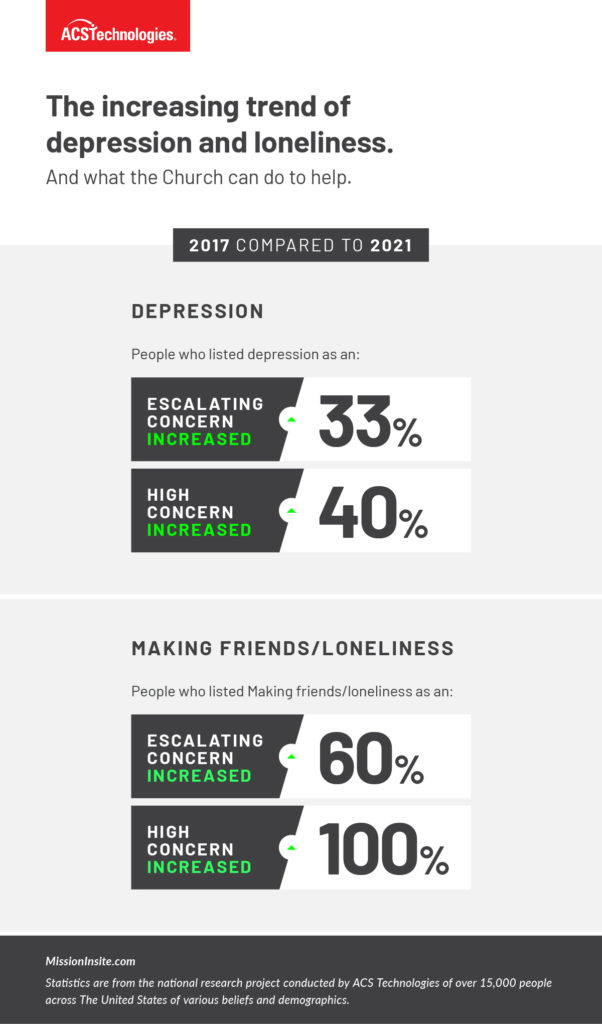The link between loneliness and depression.
Depression in America continues to rise, especially among young Americans, and our understanding of its causes and solutions seems to be getting more convoluted. In a national study conducted by MissionInsite and ACS Technologies, people who listed depression as a currently high concern increased 60% from 2017 – 2021 (26.4 million Americans), and those who listed depression as an escalating concern increased 33% from 2017 -2021 (26.4 million Americans). We may be more aware of depression and it’s increasing rates, but we struggle to understand the multifaceted, nuanced approach required to help those battling depression.
Many attribute this increase in depression to always feeling overwhelmingly busy, possibly due to added time looking at our phones and computers, and to a lack of close community. Because people are spending more time in front of screens, many don’t have as much time to foster connections with others. Unfortunately, loneliness continues to rise and our ability to make lasting connections seems to be more and more difficult. Individuals who listed Making friends/ loneliness as an escalating concern increased 40% from 2017 -2021 (23.1 million Americans) and people who listed Making friends/ loneliness as a high concern increased 100% from 2017 -2021 (19.8 million Americans). A lack of true connections, and feelings of loneliness, can over time cause many to develop major depression.

The roadmap to meaningful connections has changed.
Connection in a digital age has allowed us to keep up with friends from past life stages, maintain relationships with those that now live across the country, or to easily find a new group of friends with similar interests. We can follow their lives on social media, and as our friends list grows over the years, we may think we are truly maintaining friendships. We may be nurturing connections, but only on a digital level, not a human one.
The ease of connection has allowed many to have increased feelings of loneness without truly understanding why. Social media has proven a blessing to many friends and family that cannot be together, however, a steady diet of interactions through a screen is not a healthy way to maintain relationships. Social media is not necessarily responsible for the rise in loneliness and depression, but rather feeling rushed in our daily lives and lacking meaningful connections with others may be.
Although starting a relationship through social media is fine, whether by reconnecting with a long-lost friend or meeting someone new, individuals need to meet beyond the screen to truly create connections and combat feelings of loneliness. Our constant digital interaction has proven to be a barrier to deeper friendships, if we don’t work to make more meaningful connections. If individuals can maintain a friendship by liking a photo, but never need to make a call or meet in person, they may be left feeling lonely.
We are the most connected we have ever been, but also the most isolated. Although social media has allowed us to make a wide range of connections, making deep, lasting friendships has grown more difficult. It cannot replace the feelings of connection we get when meeting with a friend for coffee or dinner face to face. It’s by making and maintaining friendships in person that we can truly combat the unmet need for connection and prevent deeper depression from developing in those that are feeling isolated.
Three ways your church can help members combat loneliness and foster a strong community.
Many are turning to, or returning to, church as a way to make connections with others and with God. Allowing the experience to be a comfortable and welcoming one will encourage them to keep coming back. Listed below are a few ways the church can make the experience of attending church a welcoming one with many new friendships.
- Offer lots of new member events.
Many feel hesitant as they try attending a new church and would appreciate knowing what to expect in advance. A new member class or event would allow new attendees to meet others for the first time, let them know what to expect in the future, and allow them to ask questions in a safe space. The faces they meet in these settings may also encourage them to return in the future.
- Provide plenty of meetings and gatherings outside the Sunday morning time slot.
Holiday and age specific events can help members meet other congregation members outside of Sunday service and get to know each other on a deeper level. A fall festival, children’s movie night, trivia night, or summer concert on the lawn may even attract individuals not attending on Sundays but who are still looking for a place to meet others and have some fun.
- Encourage members of your congregation to join a small church group
Finally, encouraging individuals to join a small group will most effectively combat feelings of loneliness. Having a support group to walk through life together and grow closer to God is where the church excels in aiding those looking for connections.
Andrew Esparza is the founder of Kingdom Analytics. This company has served over 300+ organizations doing good in the world by helping better connect them to their community, congregation, or customers using advanced demography research. He also has experience in the church world working for the largest high school ministry in the country at North Point Community Church. Andrew graduated from Arizona State University with degrees in Design Management and Tourism Development and is CITI certified in Social and Behavioral Research.




